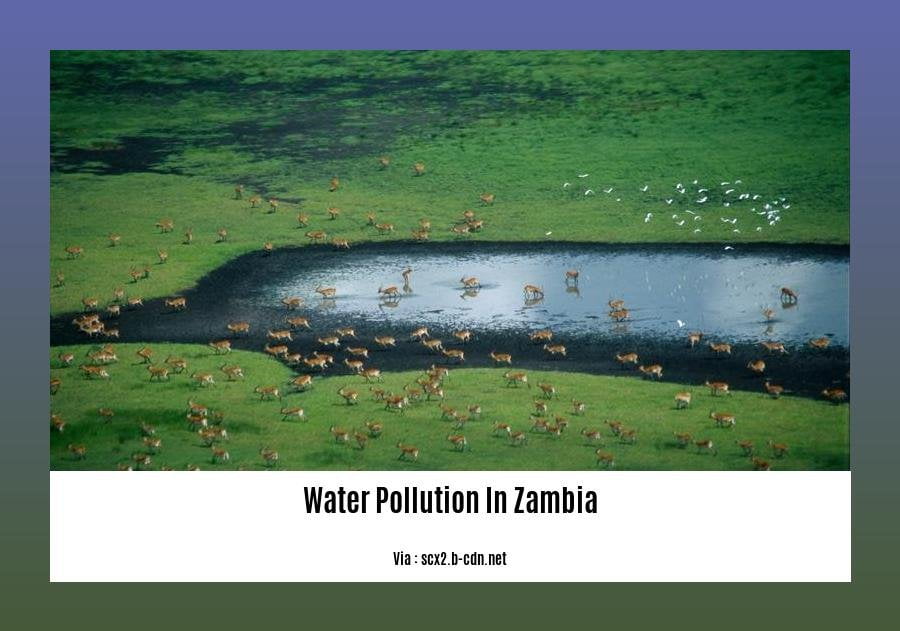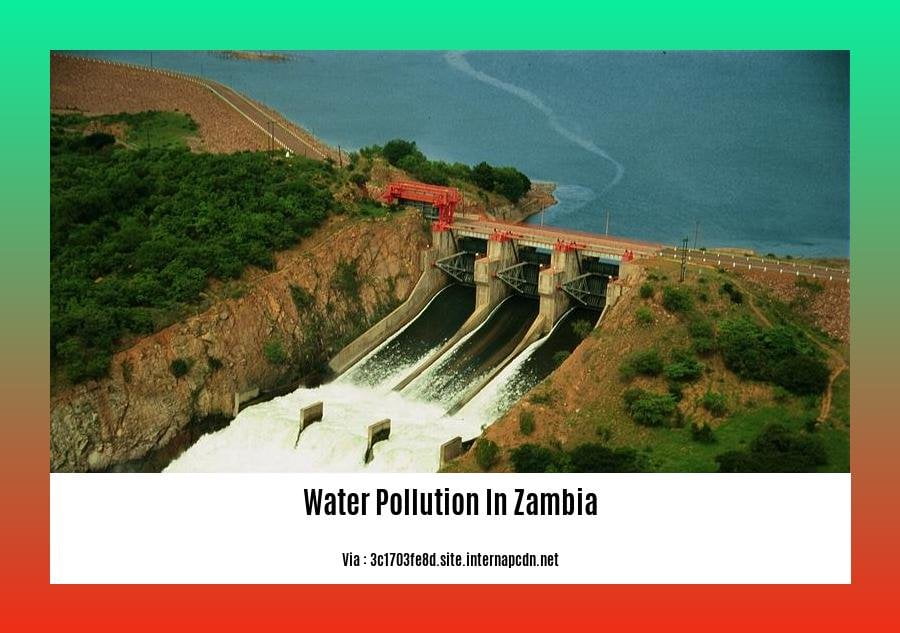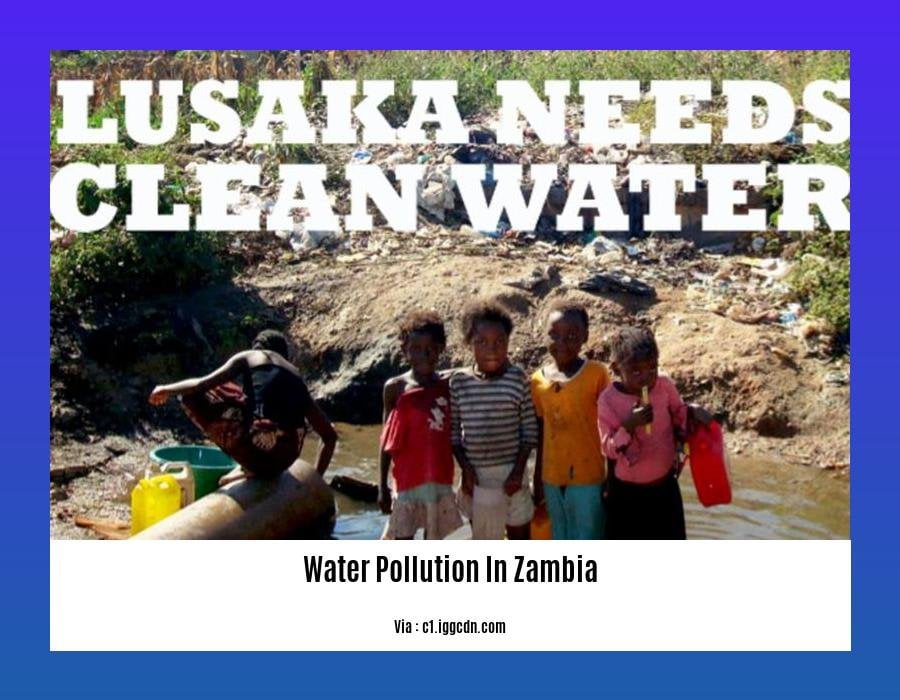Unveiling the Causes of Water Pollution in Zambia: Exploring the Factors that Contaminate the Nation’s Vital Resource
Water pollution is a pressing issue that affects countries around the world, and Zambia is no exception. In this article, we delve into the causes of water pollution specifically in Zambia, a country abundant in water resources. As we explore the factors that contaminate this vital resource, we aim to shed light on the issues surrounding improper waste management, industrial activities, and agricultural practices. By understanding the root causes of water pollution in Zambia, we can work towards implementing sustainable solutions and safeguarding this precious natural resource for future generations.
Key Takeaways:
- Approximately 5 million Zambians do not have access to clean water, leading to a significant water pollution crisis in the country.
- Sanitation is a major concern in Zambia, with about 7 million people lacking access to sanitation facilities.
- Synthetic organic substances disposed of carelessly contribute to water pollution in Zambia.
- Oil and fuel spills have a detrimental impact on water quality and pose a threat to aquatic life and human health.
- Water pollution in Zambia leads to the outbreak of various lethal and contagious diseases, posing a significant health risk to the population.
- The ecosystem of rivers, streams, and lakes in Zambia is deteriorating due to water contamination, negatively impacting plants, animals, and the overall ecological balance.
- Efforts should be made to ensure that clean water is accessible to all Zambians, especially the 5 million people currently deprived of this basic necessity.
- Provision of adequate sanitation facilities is crucial in mitigating water pollution, and access to sanitation should be extended to the 7 million Zambians currently lacking it.
- Urgent action is needed to address the lack of access to clean water and sanitation facilities in Zambia. Implementation of pollution prevention measures and improvement of water infrastructure are vital to protect the well-being of the population and safeguard precious water resources.
Causes of Water Pollution in Zambia

Water pollution is a pressing issue in Zambia, with a significant number of people lacking access to clean water and proper sanitation facilities. In this article, we will delve into the causes of water pollution in Zambia, shedding light on the factors that contaminate this vital resource and exploring the urgent need for action.
Synthetic Organic Substances
One of the primary causes of water pollution in Zambia is the rising use of synthetic organic substances. These substances are often disposed of carelessly, finding their way into water bodies and contaminating them. The improper management of chemical waste from industries, agriculture, and household products leads to the presence of harmful pollutants in our water sources^1^.
Oil and Fuel Spills
Oil and fuel spills pose a significant threat to water quality in Zambia. Accidental spills during transportation or in industrial settings can have devastating consequences. These spills not only contaminate the water but also pose a risk to aquatic life and human health^2^. The presence of oil and fuel in water bodies disrupts the ecosystem, causing long-lasting damage.
Unveiling the Consequences
The consequences of water pollution in Zambia are far-reaching, impacting both human health and the ecological balance. Let’s take a closer look at these consequences.
Outbreak of Diseases
Water pollution contributes to the outbreak of numerous lethal and contagious diseases in Zambia. When water sources become contaminated, the risk of waterborne illnesses such as cholera, dysentery, and typhoid increases significantly^3^. The lack of access to clean water exacerbates the spread of these diseases, endangering the well-being of the population.
Ecological Impact
The eco-system of rivers, streams, and lakes in Zambia is in grave danger due to water contamination. As water pollution persists, the balance of the ecological system is disrupted, affecting both flora and fauna. Aquatic plants and animals suffer the consequences of polluted water, leading to a decline in biodiversity and ecological stability^4^.
Addressing the Water Pollution Crisis
To combat the water pollution crisis in Zambia, concerted efforts must be made to implement sustainable solutions. Let’s explore some key steps that can help address this pressing issue.
Access to Clean Water
Ensuring that clean water is accessible to all Zambians, particularly the 5 million currently deprived of this basic necessity, should be a top priority. This can be achieved through initiatives that focus on improving water infrastructure, promoting proper waste management, and investing in water treatment plants^5^.
Sanitation Facilities
Extending access to adequate sanitation facilities is crucial in mitigating water pollution. Over 7 million Zambians lack basic sanitation, which has direct implications for water contamination^6^. By investing in the construction of sanitation facilities and promoting proper waste disposal practices, we can significantly reduce water pollution and improve overall public health.
In conclusion, water pollution in Zambia is a critical issue that demands immediate attention. The causes, ranging from the careless disposal of synthetic organic substances to oil and fuel spills, have severe consequences for both human health and the environment. By taking proactive steps to address these causes and implement sustainable solutions, Zambia can safeguard its precious water resources, protect the well-being of its citizens, and pave the way for a sustainable future.
Water pollution is a pressing issue in the Philippines. Discover the causes of water pollution in the Philippines and find out what actions can be taken to address this problem. Click here to learn more.
Curious about the quality of your water? Learn about common water quality tests that can help you determine if your water is safe to use and consume. Take control of your health and click here to find out more.
While water conservation is important, it’s essential to understand the potential drawbacks as well. Explore the cons of water conservation to gain a comprehensive perspective on the topic. Join the discussion by clicking here and broaden your understanding.
Negative Consequences of Agricultural Practices on Water Quality
Agriculture is an essential industry that provides food and livelihoods for millions of people worldwide. However, it is crucial to recognize that certain agricultural practices can have negative consequences on water quality. In Zambia, like in many other countries, these practices contribute to water pollution, posing risks to both human health and the environment. Let’s delve deeper into the factors that contaminate Zambia’s vital water resources.
The Impact of Agricultural Activities on Water Pollution
Zambia heavily relies on agricultural activities, including crop cultivation and livestock farming, as major contributors to its economy. Unfortunately, these practices can lead to the excessive use of pesticides, fertilizers, and other chemicals. As a result, when rain falls or irrigation is used, these substances can wash off the fields and find their way into water bodies, ultimately polluting them.
Influence of Mining Activities on Water Contamination

Mining Activities and Their Impact on Water Quality in Zambia
As we dive into the causes of water pollution in Zambia, it’s essential to shine a spotlight on the significant influence of mining activities on water contamination. The mining industry plays a crucial role in the country’s economy, but it also poses a significant threat to water resources and ecosystems. Let’s explore the factors that contribute to this environmental challenge and understand the implications for both human and ecological health.
Mining: A Double-Edged Sword
Mining operations have contributed to various environmental issues in Zambia, including air pollution, soil contamination, and ultimate water pollution. The act of extracting minerals from the earth leads to a range of negative impacts, such as spill erosion, sedimentation, acid mine drainage, and the lowering of the water table (ResearchGate). These activities can result in the contamination of rivers, streams, and lakes, affecting not only aquatic life but also human livelihoods (Academia.edu).
The Devastating Effects on Water Quality
Water pollution caused by mining activities has far-reaching consequences for both humans and the ecosystem. The discharge of heavy metals, chemicals, and sediments into water bodies can lead to the destruction of aquatic habitats and a decline in biodiversity (SGU). Moreover, the contamination of water sources poses a significant health risk to communities that rely on them for drinking, irrigation, and domestic purposes (Academia.edu).
Understanding the Pathways of Contamination
Mining activities can contaminate water through various pathways. One primary route involves the release of pollutants into the air, which then settle on the water surface and infiltrate the water bodies. This process, known as atmospheric deposition, contributes to water pollution and exacerbates the contamination caused directly by mining activities (Academia.edu). Additionally, improper waste management practices, such as the inadequate treatment of mine wastewater, can further contaminate nearby water sources (SGU).
Addressing the Issue: A Call for Sustainable Solutions
Recognizing the pressing need for action, both national and international efforts are underway to mitigate the impact of mining activities on water contamination in Zambia. Environmental assessments and remediation projects aim to evaluate and improve the situation, especially in regions like Chambishi and Musakashi River Catchment (SGU; World Bank Group). These initiatives prioritize implementing remediation measures and ensuring compliance with statutory limits on water quality (ResearchGate).
Key Takeaways:
- Mining activities have a significant influence on water contamination in Zambia, contributing to the deterioration of water quality and ecosystems.
- The discharge of pollutants, including heavy metals and sediments, into water bodies leads to a decline in biodiversity and poses health risks to communities.
- Air pollution resulting from mining operations indirectly contributes to water pollution through atmospheric deposition.
- Improper waste management practices exacerbate the contamination of water sources near mining areas.
- Environmental assessments and remediation projects are being undertaken to address the impact of mining activities on water contamination, implementing sustainable solutions for a better future.
References:
- Sveriges geologiska undersökning, SGU. (n.d.). Environmental impacts of mining in Zambia. Towards better environment management and sustainable exploitation of mineral resources.
- World Bank Group. (n.d.). Zambia Mining and Environmental Remediation and Improvement Project.
Effect of Urbanization on Water Pollution in Zambia
Urbanization and its Impact on Water Pollution
Rapid urbanization in Zambia has significant implications for water pollution in the country. As the population continues to grow, urban areas are expanding at an unprecedented rate, leading to increased wastewater discharge and a decline in water quality. This article will explore the effect of urbanization on water pollution in Zambia and highlight the key factors contributing to this growing problem.
The Role of Urbanization in Water Pollution
Urbanization brings with it a host of challenges, including increased demand for water resources and sanitation facilities. As cities and towns expand, inadequate infrastructure and limited access to clean water and sanitation become major concerns. This leads to improper waste management practices, leading to the contamination of water sources and the exacerbation of water pollution.
Factors Contributing to Water Pollution from Urbanization
1. Improper Waste Disposal: With rapid urbanization, the generation of solid waste and wastewater increases. However, the lack of appropriate waste management systems results in the improper disposal of waste, including hazardous materials. This, in turn, leads to the contamination of water sources and the proliferation of waterborne diseases.
2. Industrial Activities: Urban areas often house industries that release various pollutants into water bodies. Chemical waste, heavy metals, and other toxic substances find their way into rivers and lakes, posing a threat to aquatic life and public health.
3. Agricultural Practices: Although agriculture is primarily associated with rural areas, peri-urban agricultural activities can contribute to water pollution. The use of chemical fertilizers and pesticides, as well as excessive irrigation, can result in the runoff of pollutants into nearby water sources.
4. Inadequate Sanitation Facilities: With urbanization comes an increased need for sanitation facilities. However, inadequate infrastructure and limited access to proper sanitation contribute to the pollution of water sources, as untreated sewage finds its way into rivers and streams.
The Implications of Urbanization on Water Quality
The effects of urbanization on water pollution in Zambia are significant and far-reaching. Poor water quality not only affects human health but also impacts aquatic ecosystems and biodiversity. The contamination of water sources leads to the outbreak of waterborne diseases such as cholera, dysentery, and typhoid, causing immense suffering and loss of life.
Addressing Water Pollution from Urbanization
To mitigate the impact of urbanization on water pollution in Zambia, comprehensive strategies and investments are necessary. This includes improving access to clean water and sanitation facilities, promoting proper waste management practices, and implementing effective pollution control measures. It is essential to raise awareness among the general public and policymakers about the crucial role they play in preserving water resources and ensuring the well-being of present and future generations.
Key Takeaways:
– Rapid urbanization in Zambia contributes to an increase in water pollution.
– Factors such as improper waste disposal, industrial activities, and agricultural practices exacerbate water pollution.
– Inadequate sanitation facilities in urban areas contribute to the contamination of water sources.
– Water pollution from urbanization has detrimental effects on human health, ecosystems, and biodiversity.
– Comprehensive strategies and investments are needed to address water pollution from urbanization in Zambia.
Sources:
Texila International Journal and Kelly Mwaba. Water Pollution in Zambia
Sydney C. Hubbard, et al. Household illness and associated water and sanitation factors
FAQ
Q1: What are the main causes of water pollution in Zambia?
A1: The main causes of water pollution in Zambia include the disposal of synthetic organic substances, oil and fuel spills, and mining activities.
Q2: How do synthetic organic substances contribute to water pollution in Zambia?
A2: Synthetic organic substances, when disposed of carelessly, can contaminate water sources in Zambia, leading to water pollution.
Q3: What impact do oil and fuel spills have on water quality in Zambia?
A3: Oil and fuel spills pose a threat to water quality in Zambia, negatively affecting aquatic life and posing health risks to humans.
Q4: How does mining contribute to water pollution in Zambia?
A4: Mining activities in Zambia can result in water pollution through spill erosion, acid mine drainage, sedimentation, and the discharge of heavy metals into water bodies.
Q5: Where can I find more information about water pollution in Zambia and its causes?
A5: You can find more information about water pollution in Zambia and its causes in the Texila International Journal, Academia.edu, ResearchGate, and the Sveriges geologiska undersökning (SGU) reports mentioned in the article.
- Crypto Quotes’ Red Flags: Avoid Costly Mistakes - June 30, 2025
- Unlock Inspirational Crypto Quotes: Future Predictions - June 30, 2025
- Famous Bitcoin Quotes: A Deep Dive into Crypto’s History - June 30, 2025
















